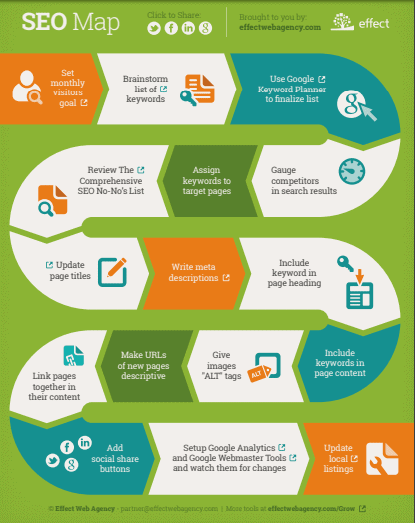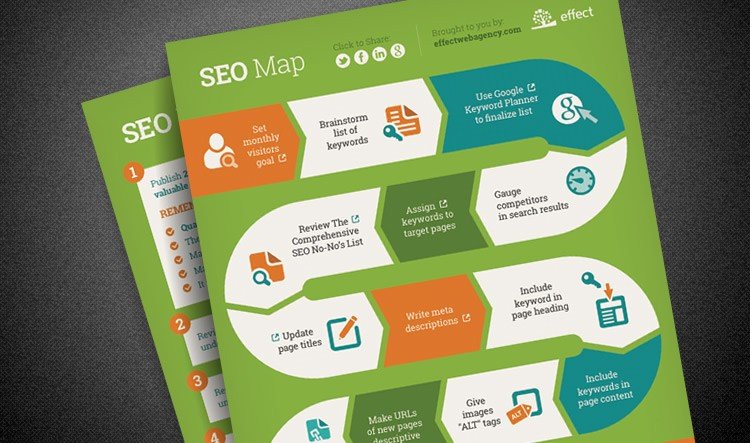Is your website performing the way you would like? Do you have traffic, but not enough qualified leads? The reason your website’s not performing the way you’d like may not be your message. It just might be that you are not reaching the right people. Search engine optimization only works if you know which keywords to target so that you reach the right audience. Without a strategic SEO Plan, you might rank well, but have lousy conversions.
“Ranking doesn’t matter if you are not being seen by the right people at the right time. You must target the decision makers who are ready to commit.” – Kim Schmutzler, Director SEO & Content Marketing, Effect Web Agency
“Great,” you say, “How do I do that”? Don’t worry. We’ve detailed some specific steps for cleaning up your SEO. This strategic SEO plan for reaching qualified leads WILL work. Be diligent and give it time and you should see more of the right kind of traffic coming to your site.

SEO-Map-and-Plan-Effect-Web-Agency
How to Create a Strategic SEO Plan
You will never reach your destination if you don’t know where you are going! The first step in creating your SEO plan is to set both stretch goals and SMART goals for your website.
Use this calculator to set a monthly goal for search engine visitors.
The Process for Setting Website Goals
Use Google Analytics to see how much traffic you’ve had monthly for the past year. Is it cyclical? Has it dropped recently? Climbed?
Traffic is good, but only if those visitors stay and engage. That’s why you also want to consider your bounce rate. Are they coming, not finding what they need, and leaving? If your bounce rates are high, you should try to determine which of these three things are causing your issues:
- Visitors can’t navigate the site.
- The wrong people are clicking through.
- Your message doesn’t resonate with your visitors.
Once you have a grasp of your historicals, you can set specific goals for your SEO campaign.
- “I want to double the number of visitors to the site.”
- “I want to improve rankings for these five niche markets.”
- “Our company wants to rank in these three local markets.”
Most companies will set short-term goals and long-term goals. Just make sure they are specific and measurable.

How To Reach Your Goals with SEO
The first step to reaching your goals is to identify your markets and your primary clients. Then you need to decide on which keywords best resonate with those clients. Consider their needs and what they are searching for.
- Brainstorm a list of 5-20 highly-specific, relevant keywords.
- Search for those terms online. Who shows up in the results? Are they related to what you do?
- Use a keyword planning tool like Google Keyword Planner to find related terms and get more ideas. You can also look at the related search terms at the bottom of the search engine results.
- Decide which web pages you want each keyword to rank for. (Up to 3 keywords/page)
- Review The Comprehensive SEO No-No’s List.
Once you know what you would like to achieve with your website and the keywords you need to engage with your prospects, then it’s time to roll up your sleeves and get to work.

The SEO Process
First of all, you need to know if Google is ranking the desktop version of your site or if you have been moved to the Mobile-First Index. This will affect which type of content you modify and where you make your technical SEO changes.
There are four types of search engine optimization that will help you rank better on Google.
1. Technical SEO
If your website does not function properly, Google won’t rank it and even if people find it they will leave.
Imagine going to a 5-star restaurant and getting a lousy waiter. It won’t matter how good the food is if the service ruins the experience.
- Do you have encryption?
- Check Google Search Console for Mobile Usability and Crawl Errors
- Make sure your site has been indexed (also available on Google Search Console)
- Run a speed test using this tool: Website Grader
- Conduct a site audit using the free version of Screaming Frog
- Access your site using both desktop and mobile devices. Objectively rate your experience.
- Review Google Webmaster Tools monthly or quarterly and address any “Not found” entries under “Crawl Errors.” These are broken links. Setup 301 Redirects for any important broken link.
Once your site runs smoothly and you’ve verified that Google is happy with the backend, then you can On-Page SEO.
2. On-Page SEO
If you have a WordPress site, you can make this step easier by installing the Yoast plugin. The process is the same for all types of sites, but Yoast will prompt you so you don’t miss anything important.
- Title your page or post appropriately – use your primary keyword and make sure the length of the title is less than 65 characters.
- Write a helpful meta description that convinces people to click on your listing. Make sure to include your keyword.
- Properly place keywords on the landing page or within an article so Google can categorize your content. Typically, your keyword is in the title, introductory paragraph, a heading, the body of your text, and in the conclusion.
- Give images an ALT tag that describes them and uses one or more keywords. Do NOT stuff the alt text with too many keywords or use phrases that don’t make sense.
- Make the URL of new pages descriptive. Example: /industrial-ceiling-fans.
- Link pages together with hyperlinks. These links help Google understand the nature of your content.
Now that you’ve done your “housekeeping” so to speak, you can begin to actively market your business using a strategic SEO Plan.

3. Content Marketing
The trick is to publish regular content in the form of new landing pages or blog posts. This encourages Google to crawl your site regularly. It also gives your visitors a reason to come back.
Publish a minimum of two new pieces of content each month that your audience will find valuable and shareable. Make sure it is quality content. You should always offer in-depth, original material that is relevant to one of your keywords. Link the content to the landing page on your site that is most relevant to that topic.
For example, we would link this article on search engine optimization back to our SEO services page.
Promote your new content on all your marketing channels: newsletter, email campaigns, social media, and even direct mail.
If you struggle to find topics, consider your FAQs. What are people asking on the phone or through email? Can you provide an in-depth answer on your site? You can also check Google Trends for current topics of discussion in your industry.
To improve SEO on your blog posts, use schema markup on your articles. If you have a WordPress site, there are several plugins that will make that easy for you.
Content Marketing involves many things and are the most time-consuming of your SEO strategies. A good content marketer will know how to integrate your online content with social media and off-line marketing.
It’s not just about ranking… let’s repeat that… it’s not just about ranking!
You must rank so people read your content, but you also have to deliver the right message at the right time if you want conversions.

4. Off-Page SEO
I’ve left Off-Page SEO to last, not because it’s the least important, but because it only matters if you’ve done the other types of SEO. Off-Page SEO involves setting your company as an industry expert.
- Guest blog or publish an article each month on another highly-respected website that is relevant. In your article, include a link to your website homepage or one of your pages.
- Monitor backlinks and develop relationships with credible sites so you can gain new ones.
- Visit forums and answer questions about your industry. Establish yourself as an “expert” in your field.
- Create videos and add them to your posts or start a YouTube channel to reach new prospects.
This takes time and unfortunately, many businesses never make it further than On-Page SEO. However, every time you interact with a potential client in their space increases the chance that they will visit yours.
Also, keep in mind that your Off-Page SEO strategies will work for other search engines as well. Bing SEO can benefit from all your Google efforts.

How to Measure the Success of Your SEO Plan
You can check on your SEO progress daily, but it’s best to step back and look at it monthly. Search engine optimization is NOT a “get traffic quick” scheme, but it’s a solid investment of resources. Here’s how you can evaluate your website success.
- Review Google Analytics each month or quarterly and see the growth of “Organic” traffic under Acquisition > Channels.
- Check your ranking for your target keywords monthly. Open an incognito window and manually search for your listing or better yet, have Effect Web Agency run ranking reports for you.
- Evaluate your results compared to your original objectives each quarterly. Some people will see changes in their ranking in the first few months (usually due to the initial on-site optimization) and others with plenty of competition will see slow growth over several years.
SEO is not…
- A project: SEO is a process with results being achieved slowly over time. You can’t do it once and then forget about it. It’s an ongoing thing.
- An end-all solution: SEO is only one piece of the marketing puzzle.
- Free: in most cases, it’s suggested that you seek the help of an SEO consultant who knows how to get you the results you want to achieve, as quickly as possible. Even if you decide to tackle it yourself, it takes time and manpower resources.
- An after-thought: If possible, implement an SEO campaign before you launch a new website. Also, don’t wait until it’s too late and your competitors have gobbled up the search results. Be proactive.
“A reputable SEO expert who is on top of current trends and technologies can get your ranked much quicker than someone who is doing it in-house, on a part-time basis.” – Steve Schmidt, Owner, Effect Web Agency
Search engine optimization is a bit of work, but the paybacks are high. Done right, an SEO plan can improve your rankings and reach the right people for more qualified leads. If you need help with search engine optimization or developing a strategic marketing plan, Effect Web Agency has experts that can help you grow your business. We build beautiful sites that perform and then support our clients by guiding them in their marketing efforts.
There are many good writers, marketers, designers, and programmers, but employing a team like Effect Web Agency, where specialists in each of those areas work together towards a common goal, can lead a company to the forefront of their industry.
Kim Schmutzler, Director of SEO & Content Marketing, [email protected]






